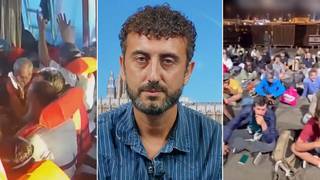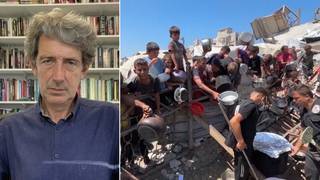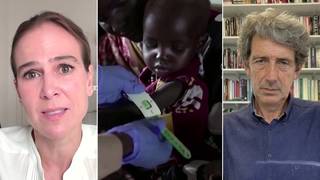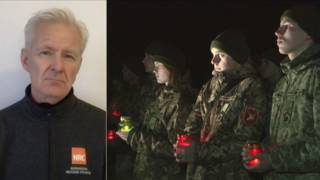
As the war in Ukraine enters its fourth week, Ukrainian officials say Russian forces have increasingly attacked civilian areas to pound Ukrainian cities into submission, a strategy Russia has employed to devastating effect in Syria, where the Russian Air Force has bombed many cities to rubble in an effort to support the government of Bashar al-Assad since entering the war in 2015. However, the international response to suffering in Ukraine signals a “very clear difference” than in Syria, says Waad Al-Kateab, the award-winning filmmaker whose 2019 Oscar-nominated documentary “For Sama” shows how she and her family lived through five years of fighting in Aleppo. “We really see that what’s happening today in Ukraine might and should be a whole reframing for all the world” to take a stance against Russia’s wars around the world and not just in Ukraine, says Al-Kateab. She is also the founder of the #StopBombingHospitals campaign, which led a protest outside the Russian Embassy in London.
Transcript
AMY GOODMAN: This is Democracy Now!, democracynow.org, The War and Peace Report. I’m Amy Goodman, with Nermeen Shaikh.
This week marks 11 years since the start of the war in Syria. The fighting has killed hundreds of thousands of people and left the nation devastated. Half the country’s 22 million residents were displaced. Today 60% of the population, some 12 million people, are facing hunger. The war began as an uprising against Syrian President Bashar al-Assad, who responded with brutal force, but it evolved into a multifaceted war involving the Islamic State, Russia, the United States, Turkey, Iran and other countries. Earlier this week, the United Nations said Syria is teetering on collapse. Many Syrians say the devastating images seen in Ukraine suggest Russia is using the same tactics now as it did in Syria.
We’re joined now by Waad Al-Kateab. She is a Syrian activist and filmmaker, award-winning director, with Edward Watts, of the critically acclaimed documentary For Sama. Earlier today, she took part in a protest outside the Russian Embassy in London to demand that Russian forces stop bombing hospitals.
In fact, you head an organization. Talk about its name and the significance of what’s happening in Ukraine and how you connect it to what happened to your country, Syria.
WAAD AL-KATEAB: Yeah. Thank you so much for having us here.
I mean, as you just mentioned, what’s happening today in Ukraine is something really coming across like what we’ve been talking about in the last 11 years, from the start of the Syrian revolution. It’s just very sad and interesting, really, actually, to hear all this conversation about no-fly zone, the arms, what other countries can do, and just to take one step back and think about what’s happening. It’s not about Ukraine. It’s not about Syria. It’s about Russia and what they can and they are capable to do.
And I think there are so many questions, like negotiating kind of the details and the deals and how this could be solved. But I think the main question should be about Russia’s position in the world; the U.N. Security Council, the U.N., all these organizations and governments’, like, responsibilities and rules toward not just Ukraine today, not just Syria, not even like Afghanistan. It’s about all our life. It’s about what next. Even if Ukraine today was like part of the NATO or not, like, this is not about Ukraine today. And I really, really hope people can just take it as a, like, overall conversation, more than just like what’s happening exactly today.
And what the world is waiting for? Calling for a non-fly zone would, like, make maybe things worse with Russia, but, you know, if they solve this today, it’s coming tomorrow in a different way, in a more brutal way, in more like breaking laws and doing more crimes and having people more killed, attacking more hospitals. And I’m just, like — it’s really very frustrating, all this conversation happening around the world.
NERMEEN SHAIKH: And, Waad, can you talk about your own experience in Aleppo? Your husband, of course, was a doctor, Hamza, who worked in a hospital in Aleppo when hospitals were being attacked. And he said at the time that “If you want to be safe, you should go to the frontline. That’s the safest place in Aleppo” — in other words, safer than being in a hospital. Could you talk about what the effect was then on the civilian population of these attacks on hospitals, and whether you think that the situation today, for example, in Mariupol, is comparable to what happened during the siege of Aleppo?
WAAD AL-KATEAB: Yeah, I mean, like, not a single picture came out of Ukraine without really, like, affecting us deeply. All these civilians now, all these people who are going out to fight against what’s happening in their country, all these hospitals who are being bombed, the pregnant woman who was like carried by people trying to escape after her house was attacked — all these pictures is exactly what we have been through. And, you know, for a second, we thought, like, we might be numb, or we might feel like really unaffected by what’s happening, but it is deeply affecting us and deeply, like — I think we were very disappointed by the whole international reaction to Syria. We were a little bit feeling better, because we felt that people are really caring about Ukraine today. But at the same time, like, we are worried about how long this would take to take any action.
And I lived in a hospital with my daughter and my husband, where — you know, like, the whole film I’ve made out explain a lot of this experience. We’ve been under attacks, like, by Russia, by the Syrian regime. People were arrested and kidnapped and disappeared in Syria by various forces, like mainly the Syrian regime. And all of this now is happening again in Ukraine. I’m just really, really shocked. What the world is waiting for? What more you need to see? How many hospitals should be more bombed? I mean, 11 years now in Syria, and the whole world sees and knows all of this. And as Syrians, you know, we are now across the whole world. Today in front of the Russian Embassy, we tried to stand and say, “Stop bombing hospitals again.” Like, I made this as a statement in Cannes Film Festival three years ago, when For Sama was out. We tried to make it before. We tried to make it after. And I’m just — I can’t really believe how long the world needs to wait until more people will be killed, until more children will be, like — you know, like, their life now is horrible, as our life was, as our life still, until today, in so many other various places inside Syria.
NERMEEN SHAIKH: And, Waad, can you talk — you mentioned, of course, as we did, too, that this month marks the 11th anniversary of the war in Syria. First of all, you’ve insisted that the war not be called a civil war, as many still refer to it as. So, could you explain why, and then, second, what the humanitarian situation in Syria is now like, 60% of the population now reportedly facing hunger, with the average price of food higher than at any time in the last nine years?
WAAD AL-KATEAB: Yeah, I think what we are going through now is 11 years of, what we call it, revolution in Syria. What was happening on the floor was revolution, was like — on the ground, thousands of Syrians were protesting in 2011, trying to end Assad’s control of Syria, corrupted system. Like, a whole of crimes was happening, and was still happening until today. I refuse, as so many Syrians, to call it a civil war, because it’s not a civil war. It’s not Syrians from different religions or, like, groups are fighting each other. It’s a power, it’s the regime, supported by Russia, Iran, Hezbollah — which, surprisingly, is kind of what’s happening today in Ukraine. It’s invention, as it is now in Ukraine. And I was so happy to start also, like, see people and journalists and people reporting this as not like “stop war” in Ukraine. It’s not “stop war.” It’s “stop Russia.” And that’s a huge difference, and in even how we deal with these people, how we react to what’s happening.
The situation today in Syria, after 11 years, is, like, very, very, very bad. Assad regime, after all the crimes that he has committed, is still ruling Syria. He’s still controlling over, like, maybe 80% of Syria. And economically, security, like, the basic life is not existed anymore, with over, like, hundreds of thousands of people who are in Assad’s prisons today, where all their beloved ones has no information about them. They don’t know if they are alive or not. And hospitals and buildings and towns still being attacked by the Assad regime, supported by Russia, until today, in Idlib.
I mean, I don’t know where we are going. But what I really know, like, we really see that what’s happening today in Ukraine might and should be, like, a whole reframing for all the world system, for all the laws that these countries are making, for all the future. The U.N. Security Council should have Russia out as a permanent, like, country, but also should — all these crimes should be under accountable. And the Russian and the Syrian regime and all other countries who committed crimes, they should be stopped.
AMY GOODMAN: Finally, Waad, if you can respond to if you feel there’s a difference between the way Ukrainians are seen in the world, particularly Ukrainian refugees? Right now, what, one every — one Ukrainian child every second is being made a war refugee. I mean, your country, Syria, the millions of refugees that have been created over this last more than decade. Do you think there was a difference in the world’s response and the media’s response?
WAAD AL-KATEAB: I mean, yeah, there is, like, absolutely, a very clear difference today. But what I really want to say, like, we lived through this. I don’t want to say, like, there was a different, and this should be kind of like deal with them as we — as they’ve been dealt with us. What I really want to say, I don’t want anyone around the world to live through what we lived through. I don’t want anyone to feel like being rejected or having escaping war and crimes and bomb and being, like, not welcomed in any place. I think we should really look back at all of our judgment about so many things, and thinking about others, and just try to live in this world, because refugee or, like, war and what happened in Ukraine or in Syria before, it’s not who you are. It’s something happened to you. And this could be today in any other place around the world. We have just to be more human with each other, with ourselves, and really, like, try to help as much as we can.
AMY GOODMAN: I want to thank you so much for being with us. Waad Al-Kateab is a Syrian activist —
WAAD AL-KATEAB: Thank you.
AMY GOODMAN: — and filmmaker, award-winning director, with Edward Watts, of the critically acclaimed documentary For Sama. She was part of a protest this morning outside the Russian Embassy in London demanding that Russian forces stop bombing hospitals. In fact, she founded the campaign Stop Bombing Hospitals.
Next up, we speak to Human Rights Watch about the use of cluster bombs in the war in Ukraine. And why did the U.S. ambassador to the U.N. condemn Russia’s use of cluster bombs in Ukraine and then delete the tweet? Stay with us.












Media Options